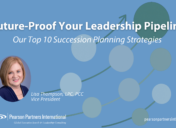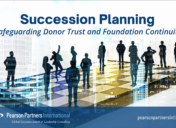What Is Your Career Legacy?
As an executive search professional, I often speak with senior leaders about career transitions. Among the most meaningful conversations are those when executives shift their focus from “what’s next” to “what will remain.” This stage is considered the legacy phase of one’s professional journey.
The legacy phase typically emerges in the latter stages of a career and is marked by a shift in focus, from personal advancement to collective contribution. Rather than pursuing new skills or the next opportunity, leaders approaching the legacy phase of their career begin to ask deeper questions about meaning, purpose and what they will leave behind.
Common themes I discuss with executives entering this phase include:
Legacy and Impact
In their legacy phase, many leaders become less focused on individual recognition and more attuned to the long-term impact of their work. They begin asking:
- What have I built that will endure?
- How have I helped shape the culture, strategy and direction of my organization and industry?
This phase is often the time to consolidate lessons learned and codify ideas into systems or processes that can continue to impact your organization well beyond your tenure.
Mentorship and Knowledge Transfer
Legacy is not just about what you have achieved. It is also about how you have elevated and influenced others. Many leaders find renewed purpose in mentoring future executives, coaching rising stars or sharing leadership wisdom more broadly.
Knowledge transfer can be a powerful tool for multiplying your impact, whether through formal programs or informal relationships.
Legacy and Succession Planning
Thoughtful succession planning is one of the most important (and often overlooked) ways to shape a legacy. Identifying and developing future leaders helps to ensure continuity, preserve institutional knowledge and secure a strong leadership pipeline for the future.
This phase might involve preparing a direct successor, supporting board-level transitions or mentoring potential leaders to widen the bench.
Reflection and Gratitude
For many executives, the legacy phase is a time of introspection. They reflect on the arc of their career: the wins, the setbacks and the lessons. It is also a time to express gratitude for mentors, colleagues and the opportunities that shaped their professional journey.
Some leaders give back through nonprofit work, philanthropy or teaching, sharing their knowledge and experience with the broader community.
Selective Engagement
The legacy phase often prompts a shift in how leaders engage, with greater intention and alignment to personal values. Many executives transition into board service, part-time consulting or passion projects aligned with their personal values.
This intentional realignment enables more flexibility, deeper fulfillment and the ability to pursue meaningful work without the demands of day-to-day leadership.
Questions to Ask Yourself About Your Legacy
If you are approaching the legacy phase of your career, consider the following:
- What will I be remembered for professionally?
- Whom have I helped to grow and succeed?
- What unfinished work and lasting impact might I still want to achieve?
- How do I want to spend my remaining time in the workforce?
The legacy phase is less about professional gain and more about meaning, transition and contribution. It is when values, wisdom and influence take center stage—shaping a legacy that endures long after your last day in the office.
Need a sounding board? I work with senior executives to assess the current stage of their career journey and craft a legacy strategy that reflects their values, goals and long-term vision. Let’s connect to explore how you can shape the next—and perhaps most meaningful—phase of your career.
Related Posts
- ← Global Leadership, Talent Strategy and Trusted Advisory
- Strategic Agility in a Shifting Landscape: How Texas Businesses Are Navigating Uncertainty →
















